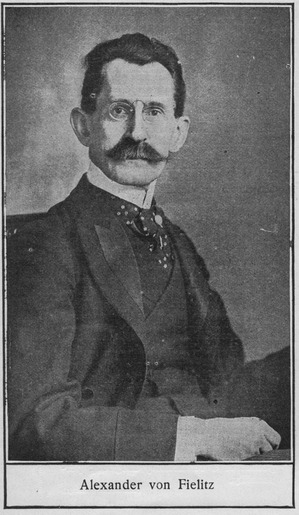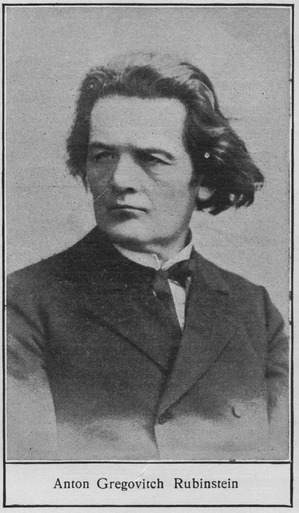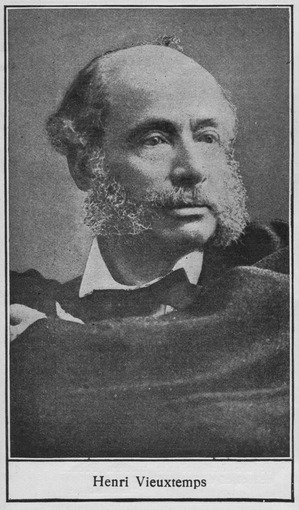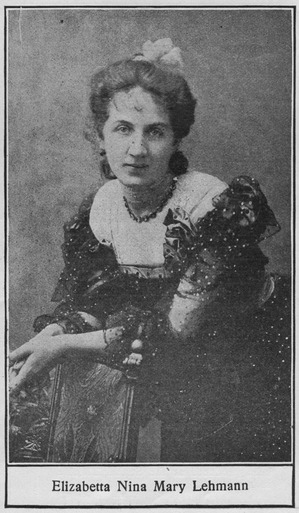The widespread satisfaction which these portrait-biographies have given to our readers during the past year has decided us to continue the feature for another year. The portraits and biographies published during the past year may now be secured in book-form for the benefit of those who have not desired to make a scrap-book, and yet wish to keep these unique pictorial aids to musical education.
(Fee'-litz.)
Alexander von Fielitz was born in Leipzig, Dec. 28, 1860. His father was half Polish and his mother Russian. He studied composition in Dresden under Edmund Kretschmer and pianoforte under the direction of Julius Schulhoff. In 1887 he conducted under the direction of Arthur Nikisch. Owing to delicate health, however, he was obliged to leave his home and go to Italy, where he remained for ten years. It was here that he composed much of the music by which he is best known. He wrote many songs, piano pieces, two suites for orchestra and two operas, one of which, Das Stille Dorf, obtained a hearing at Hamburg, March 13, 1900 and has since been played in many cities in Germany. The composition by which he is best known, perhaps, is the beautiful song-cycle called Eliland, though this is only one of a number of works of a vocal character which have brought him fame. At present he is engaged in teaching at the Stern Conservatorium in Berlin, and was appointed conductor at the Theater der Westens in that city in 1904. Von Fielitz has been to America, and taught for some time in Chicago. He is a man of wide educational attainments, and is eminently fitted for the prominent part he has played in the educational life in Berlin. He is exceptionally gifted as a linguist, and possesses a remarkably magnetic personality.
(Roo'-bin-stine).
Born at Wechwotynecz November 28, 1830, Rubinstein died at Peterhof, November 20, 1894. His first musical instructor was his mother, but a Moscow piano teacher named Villoing gave him lessons, and in 1839 he made his first public appearance in Moscow. A year later he studied under the guidance of Liszt in Paris. He also made the acquaintance, of Chopin. A long tour through Holland, England, Germany and Sweden followed, and in 1845 Rubinstein went to Berlin to study composition with Professor Dehn. In 1846 he went to Vienna, and Pressburg as a teacher, and two years later returned to Russia. Another long course of eight years' study followed, but at the end of this time Rubinstein came to his own. He appeared first in Hamburg and then all over Germany, both his playing and his compositions being most enthusiastically received. Success followed throughout Europe. In 1858 Rubinstein returned to St. Petersburg, where he founded the Imperial Conservatory. In 1867 he went abroad again, touring America in. 1872. His compositions were very numerous in all forms. Of his larger works, the "Ocean Symphony" is perhaps best known. Of his short piano pieces the famous "Melody in F" is most familiar to our readers. As a pianist he ranked second only to Liszt as regards technique, while he possessed most remarkable fire and passion.
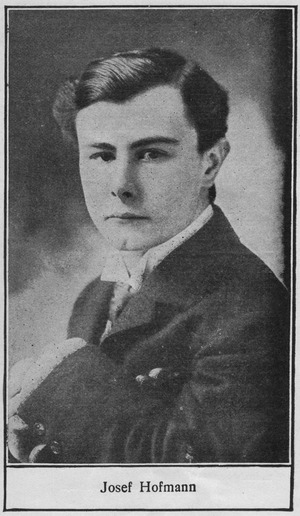 JOSEF HOFMANN.
JOSEF HOFMANN.
Hofmann was born at Cracow, June 20, 1877, and was the son of a professor of the conservatory, and director of the opera at Warsaw. His mother was a singer, so that if heredity counts for anything, Hofmann selected his parents with great foresight. He first appeared in public at a charity concert before he was six years old. At the age of eight he played the Beethoven Concerto in C minor in such a way as to cause Rubinstein, who was present, to declare that he was a boy such as the world had never produced. Soon after this he toured Europe as a prodigy with the greatest success. In 1887 he came to America, and appeared at so many concerts as to cause his health to break down. The matter was taken up by the Society for Prevention of Cruelty to Children, and caused a great deal of public discussion. In consequence of this Hofmann retired for six years, most of which time was spent in Berlin, though for two years Hofmann was a pupil of Rubinstein, with whom he was on terms of intimate friendship. In 1894 he again made his debut, in Dresden, and in 1898 repeated his former success in America, this time as a mature artist. He possesses a most remarkable technique, and is exceedingly versatile, being a skilled mechanic among other things. He has composed many pieces for the piano, a pleasant little "Humoreske" among them.
(Vyay'-tangh).
Vieuxtemps was born at Verviers, February 20, 1820, and died June 6, 1881, at Mustapha (Algiers). He first studied the violin as a child under his father, and under a very conscientious teacher of the name of Lecloux. At the age of nine he attracted the attention of de Beriot, who took him to Paris and instructed him free of charge. In 1830 he made a successful public appearance in Paris, and then went on tour. He studied composition under Sechter in Vienna, and later to better purpose, under Reicha in Paris. In 1840 he won his first great success, when he played his concerto in E, and his Fantasia in A at Brussels. These works were both' written in Russia. A year later, his genius and great virtuosity were acknowledged in Paris, and Vieuxtemps had "arrived." In 1846 he went to Russia at the invitation of the Czar, in order to train violinists, but after five or six years he once more wandered afield. This time his journeys not only included the regular European cities, but extended to Turkey and to America, (1844, 1857, 1870). In 1871 he went to Brussels as professor of the violin at the Conservatoire, but two years later was stricken with paralysis. His recovery was slow, and he lived for the most part in retirement in his beloved Paris, to which he always returned from his travels. It has been said that "he stood with de Beriot at the head of the modern French school of violin playing."
(Lay'-man.)
"Liza" Lehmann, as she is more generally known, was born in London, July 11, 1862. Her father was a painter, and her mother, a highly gifted amateur musician, was the daughter of Robert Chambers. Many of her compositions under the pen- name of "A. L." are well known. Liza Lehmann first studied singing with her mother, but later was a pupil of Randegger. She also studied in Rome and in Wiesbaden, and with Hamish MacCunn. She made her debut as a singer in London, November 23, 1885, making a fine reputation, which she maintained during the nine years she was a professional singer. She retired from the concert stage on the occasion of her marriage to Mr. Herbert Bedford, a well-known English musician. Since her retirement she has mainly devoted her attention to composition, and in 1896 her song-cycle In a Persian Garden, was produced in private. Soon afterward it was performed in public at one of the Monday popular concerts with great success. This work has become very famous in America. It was followed by The Daisy Chain and other works, many of which are exceedingly beautiful. Mme. Lehmann is probably the first woman to have been commissioned to write a musical comedy, her Sergeant Brue having been produced at the Strand Theatre in 1904.
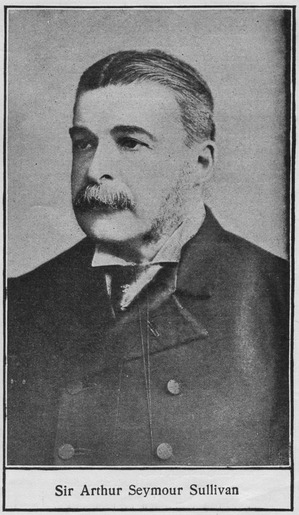 SIR ARTHUR SEYMOUR SULLIVAN.
SIR ARTHUR SEYMOUR SULLIVAN.
Sullivan was born at London, May 13, 1842, and died in that city Nov. 22, 1900. His father was clarinet instructor at Kneller Hall, a military training school for musicians. In 1854 Sullivan became a chorister at the Chapel Royal. Then he won the Mendelssohn Scholarship and proceeded to Leipsic, where he studied under Richter, Hauptmann and others. On his return to London his incidental music to Shakespeare's Tempest was very favorably received. He became organist at one of the big London churches, and wrote many anthems and hymns, including Onward, Christian Soldiers. Though Sullivan composed many well-known oratorios and cantatas, such as The Golden Legend and Kenilworth, and numerous songs, of which The Lost Chord is perhaps the most popular, he is best known as a composer of light opera in collaboration with Sir William S. Gilbert. H. M. S. Pinafore created a great sensation throughout the English-speaking world, and was followed by many splendid works of a similar kind, such as The Mikado, The Gondoliers, Patience, The Yeoman of the Guard and Iolanthe. Apart from being a composer Sullivan was an active worker and did yeoman service as head of the National Training School of Music in South Kensington, for which he was knighted in 1883.


